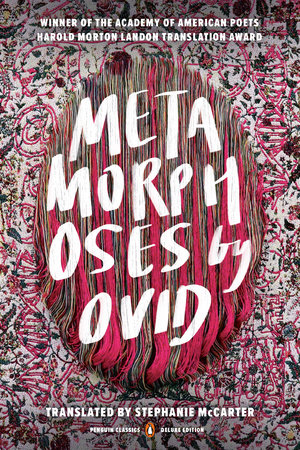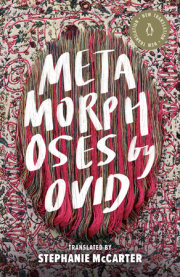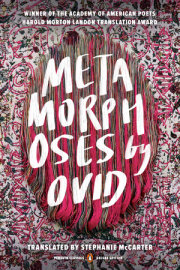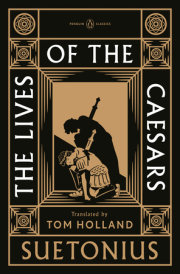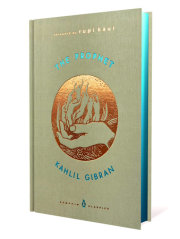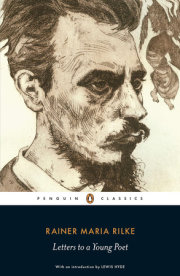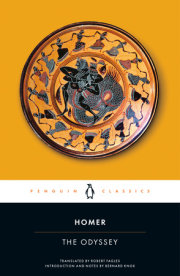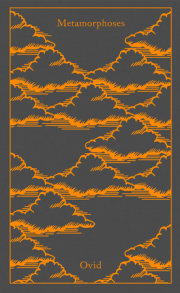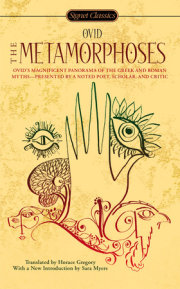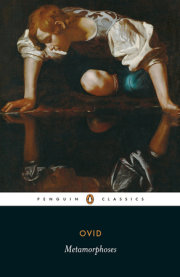“The true brilliance, that is, the true reading, the accessibility, of McCarter’s tapestry lies in her use of poetic form.(…) Throughout, McCarter produces gorgeous basso continuo undertones juxtaposed against sharp and high-pitched rhymes. Such formal elements of the translation ultimately represent McCarter’s interpretation of Metamorphoses and the art of translation itself—that humble human craft that has the capacity to stand against and despite the will of gods, power, and time. McCarter has produced her own masterpiece that ‘Jove’s wrath cannot / destroy, nor flame, nor steel, nor gnawing time.’ ‘My name,’ she writes, ‘can’t be erased.’”
—Anna Deeny Morales, 2023 American Poets Prize citation for The Academy of American Poets
“The best translation of a work of ancient literature that I read this year was Stephanie McCarter's marvellous new translation of Ovid's Metamorphoses, in fresh, readable, vivid iambic pentameter. McCarter captures Ovid's wit and cleverness, making us laugh at the escapades of abusive, lust-crazed, arrogant gods and hapless, also lust-crazed and arrogant mortals. But she also brilliantly evokes Ovid's more serious sides, including his attentiveness to power and the magical vivacity of the natural world. Her wonderful handling of the metrical poetic form is a fitting match for Ovid's artful, fluent Latin verse.”
—Emily Wilson, The New Statesman
“McCarter confronts the tricky issues associated with both the poet and his epic not only in her forthright introduction but in the translation itself, where, like an art restorer removing decades of browned varnish from an Old Master, she strips away a number of inaccuracies and embellishments that have accreted in translations over the decades and centuries, obscuring the sense of certain passages, particularly those portraying women and sexual violence… McCarter’s translation reproduces Ovid’s speed and clarity. Even better, she is alert to many of the sparkling verbal effects for which the poet was famous in his own time… If you didn’t know she was writing about the concerns of someone who died twenty centuries ago, you’d think her subject was still alive.”
—Daniel Mendelsohn, The New Yorker
“McCarter adroitly captures Ovid’s glittering darkness. There is horror here but there is also so much wonder and delight, all conveyed in nimble, fresh language.” —Kamila Shamsie, author of Home Fire
“The Metamorphoses has it all: sex, death, love, violence, gods, mortals, monsters, nymphs, all the great forces, human and natural. With this vital new translation, Stephanie McCarter has not only updated Ovid's epic of transformation for the modern ear and era --- she's done something far more powerful. She's paid rigorous attention to the language of the original and brought to us its ferocity, its sensuality, its beauty, its wit, showing us how we are changed, by time, by violence, by love, by stories, and especially by power. Here is Ovid, in McCarter's masterful hands, refreshed, renewed, and pulsing with life.”
—Nina MacLaughlin, author of Wake, Siren: Ovid Resung
“Stephanie McCarter’s gorgeous verse translation of the Metamorphoses is ground-breaking not just in its refreshingly accessible approach to Ovid’s syntax and formal devices but for how she reframes the controversial subjects that have made Ovid, and Ovidian scholarship, so fraught for contemporary readers. McCarter’s translation understands that the Metamorphoses is a complex study of power and desire, and the dehumanizing ways that power asserts itself through and on a variety of bodies. McCarter’s deft, musical, and forthright translation returns much needed nuance to Ovid’s tropes of violence and change, demonstrating to a new generation of readers how our identities are always in flux, while reminding us all of the Metamorphoses’ enduring relevance.”
—Paisley Rekdal, author of Nightingale
"A graceful and fluid and deeply meaningful translation. Compared to the other translations of the Metamorphoses on which I’ve relied in the past, it’s as though this is of an entirely different book. The reader follows the lines with genuine emotion. And so do worlds open up—"
—Alexander Nemerov, Carl and Marilynn Thoma Provostial Professor in the Arts and Humanities, Stanford University
"Stephanie McCarter’s translation offers an attractive alternative to the finest versions to appear in recent decades, while the abundance of her introductory and explanatory material gives her work a clear advantage over those predecessors. As a vehicle for serious engagement with Ovid’s poem in English, McCarter has no rival." – Richard Tarrant, Harvard University, Bryn Mawr Classical Review

